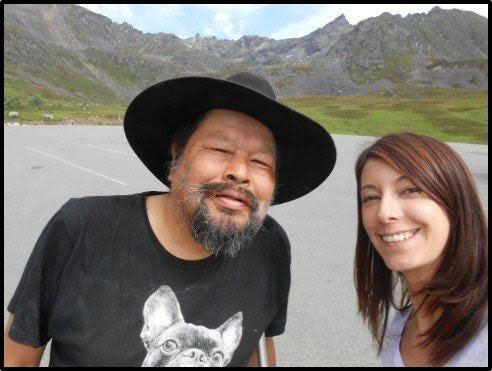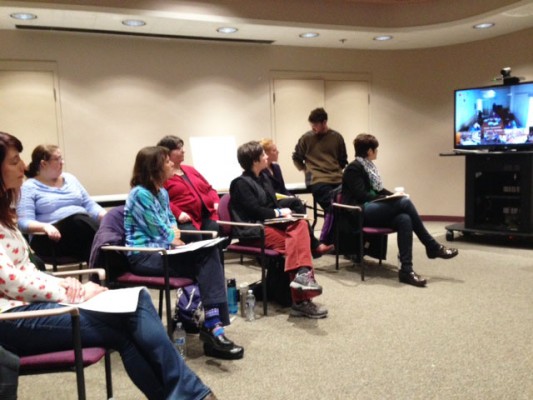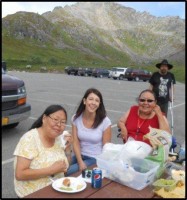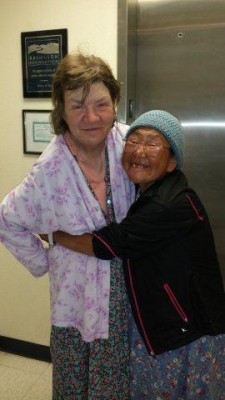UAA volunteers organize homelessness forum at Loussac Library
by Kathleen McCoy |
A handful of UAA volunteer faculty and students recently organized an open community forum on the issue of homelessness in Alaska, called "Northern Voices on Homelessness."
The session took place Saturday, March 7, 2015 in a small conference room on the ground floor of the Loussac Library. It included participants from Nome, Juneau and Bethel who communicated with the Loussac group through the Alaska state library system's OWL network.
According to Rebecca Barker, a spokesperson for the Anchorage organizers, the goal was to "learn more about issues surrounding northern homelessness and build a dialogue about positive solutions."

Johnny, left, is a resident of Karluk Manor. He is pictured with Shannon O'Connell, a Karluk Manor case manager and a graduate in social work from UAA. (Photo courtesy of Karluk Manor)
In their press release, the group posed two questions:
- If funding wasn't a barrier, what would you do to end homelessness?
- What single thing should be done this year to make progress toward ending homelessness?
Key volunteers from UAA included facilitators Travis Hedwig, an assistant professor of health sciences, and Sally Carraher, an assistant professor of anthropology and an applied medical anthropologist. They were aided by Barker, Erica Mitchell and Madeline Hall, all students at UAA.
The organizers invited representatives from key social service agencies in Anchorage and Alaska to offer the audience background on the issue. They also invited a handful of residents living in Karluk Manor, a Housing First facility in Anchorage that targets homeless alcoholics who are not ready to give up drinking. Organizers Hedwig and Carraher welcomed their perspectives and they participated actively.

Northern Voices on Homelessness met Saturday, March 7 at Loussac Library. Participants from around the state connected via the state library's OWL network. (Photo by Kathleen McCoy/University of Alaska Anchorage)
The meeting began with a general introduction of agency representatives, including Catholic Social Services, Anchorage Coalition to End Homelessness, Covenant House and Karluk Manor and professors Sharon Chamard and Marny Rivera of the UAA Justice Center. Participants from rural areas were included in the introductions and invited to share input.
Barker said after Saturday's session, organizers would spend the next several weeks reviewing the recorded proceedings and delivering their findings to key stakeholders. She said the group hoped this effort would lead to additional opportunities for dialogue on homelessness in the north.
Baseline facts

Margaret N. on the left, case manager Shannon O'Connell, Rita C. in red, and Johnny M. on the right. (Photo courtesy of Karluk Manor)
Before the discussions began, organizers referred participants to a fact sheet they had pulled together. Among details shared:
- Just 10 percent of Alaskans experiencing homelessness are chronically homeless.
- Last year 3,936 homeless and housing-insecure students were enrolled in Alaska schools.
- Average monthly rent in Alaska's larger cities is $1,069. To afford $1,069 rent per month, a person would have to work full time at $20.56 per hour (based on 30 percent of income). A minimum-wage worker would need to work 106 hours per week. A worker paid $9.75/hour would have to work 91 hours per week.
- 16.5 percent (1 in 6 homeless people) have chronic substance abuse issues (5 of 6 do not).
- 11 percent of Alaskans experiencing homelessnesss also experience severe mental illness.
- In Anchorage, 28 percent of the homeless are survivors of domestic violence.
Here is a sample of insights and remarks from the ad hoc roundtable discussion:
Many faces of homelessness
Agency representatives said the public often has a stereotyped view of the homeless as a chronic alcoholic. Carmen Springer from the Coalition to End Homelessness said 80 percent of the homeless experience being without a roof for a brief period before once again regaining stable housing.
A representative from Karluk Manor indicated their youngest clients are in their 20s and their oldest is 69. Most have mental illness that can include chronic alcoholism. Some have medical disabilities, some are veterans from wars, others are veterans who have not fought in wars.
A Covenant House representative said her agency is often asked why youth are not back living in their family homes. Often returning home is not an option, she said, due to histories of family violence or abuse. Many of their youth have transitioned out of the foster care system. She said the agency is seeing more homeless youth couch surfing or living in camps around town.
Lack of affordable housing
Anchorage's low vacancy rate is much lower than the national average, the coalition representative said. People are asked to make unrealistic choices between paying rent or buying food.
A Karluk resident said homelessness was attractive because he didn't like having to answer to anybody. He acknowledged that he got a corporation check four times a year. "To me that meant I had a roof over my head one month out of every four." When he was in a tent, no one could tell him who he could visit with or who he could drink with.
"Maybe I just got old. But I figured living out there I was gonna die. In one year I went to 34 funerals of my friends." His advice for stakeholders who want to resolve the homelessness issue: "You gotta get past how you are going to tell someone that a roof over their head is going to be better than getting drunk."
Another Karluk Manor resident said he appreciated that he had a case manager who handled his money. "I am irresponsible with my finances. Before, when I got my Native corporation check, I'd use it up in three days. If you are an alcoholic or a drug addict, you can't just walk by a liquor store. I am grateful for the Office of Public Advocacy. They take my check. Money and me are like oil and water."
One Karluk Manor resident chastised the panel of experts for turning homelessness into numbers.
"The problem is not going to go away when you guys put numbers on it. We are not numbers. If you put numbers on us, you bury us now. I am human and I have an alcohol problem."
Public responses
The second half of the afternoon was spent in small discussion groups, reacting to the information and feedback they had heard. A young woman in the last group to report called for compassion.
"We need to be celebrating the humanity of our homeless citizens," she said. "We are all basically the same. Some of us drive nice cars and some of us are sleeping in our cars. We see these things as making us different. They don't."
Another member of the public added: "The reason everyone is here is because we are a community. The community of Alaska. It's not what I need and what you need and what can you offer me. I don't want it to be us or them. It is all us."
Sponsors for the public forum included:
- UAA Department of Health Sciences
- UAA Department of Anthropology
- Alaska OWL network
- Anchorage Public Library
Written by Kathleen McCoy, UAA Office of University Advancement
 "UAA volunteers organize homelessness forum at Loussac Library" is licensed under a Creative Commons Attribution-NonCommercial 4.0 International License.
"UAA volunteers organize homelessness forum at Loussac Library" is licensed under a Creative Commons Attribution-NonCommercial 4.0 International License.















